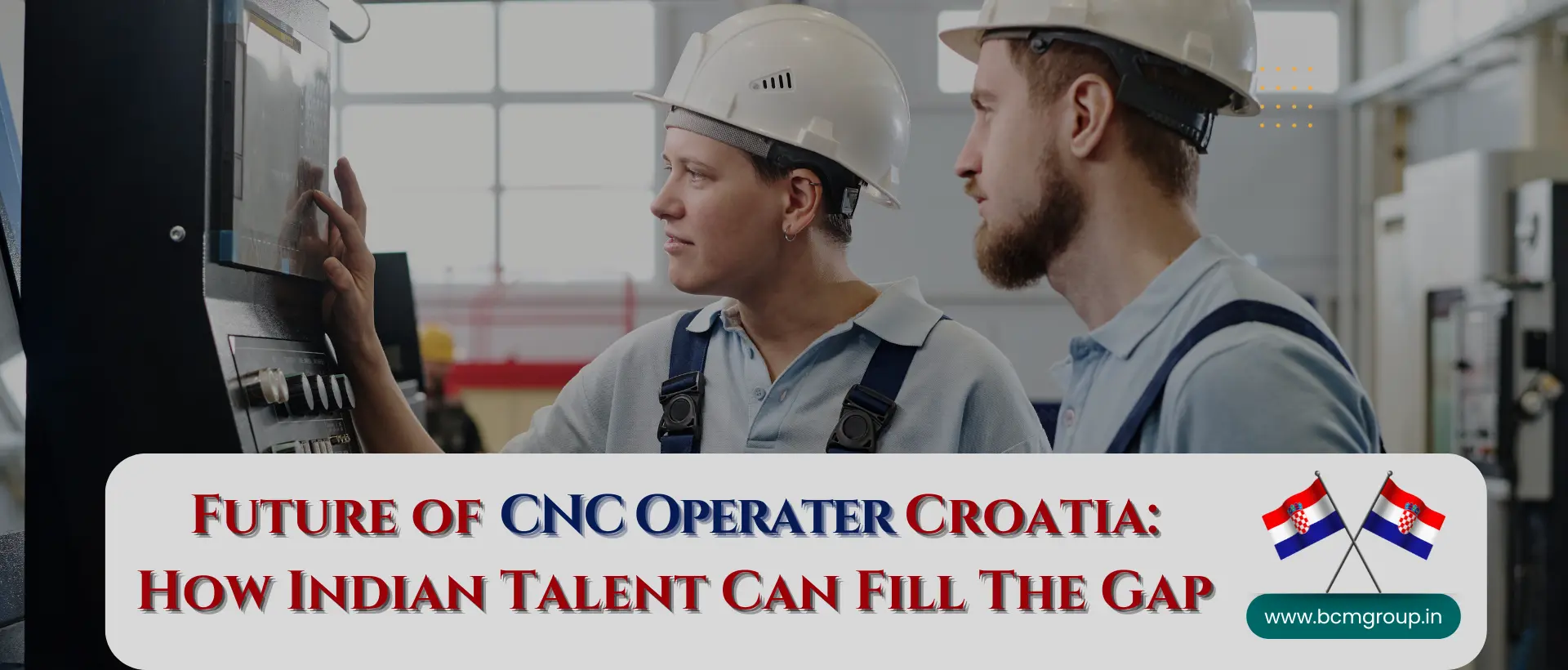
Hrvatska, sa svojom razvijajućom industrijalizacijom, očekuje porast potražnje za visoko kvalificiranim CNC operaterima. Središnja pozicija koju CNC industrija zauzima unutar drugih industrija poput automobila, zrakoplovstvo i proizvodnja zahtijeva umove koji mogu upravljati složenim strojevima za precizne rezultate. Ipak, Hrvatska se suočava s ozbiljnim izazovom rastuće razlike u vještinama koja bi mogla usporiti industrijski napredak.
Raspravite o budućnosti CNC operatera u Hrvatskoj, izazovima u ispunjavanju potražnje za kvalificiranom radnom snagom i kako Indija može pomoći u rješavanju ovog problema.
Automatizacija i povećana potreba za preciznim inženjerstvom u različitim sektorima nastavljaju poticati brzi rast CNC industrije u Hrvatskoj. Hrvatske tvrtke se opremaju najnovijim strojevima kako bi se suočile s jakom globalnom konkurencijom. Ipak, automatizacija ne znači nužno da neće biti potražnje za vještim operaterima; umjesto toga, povećava potražnju za programerima obučavanim za održavanje i popravak ovih sofisticiranih strojeva.
AI i IoT pretvaraju tradicionalne proizvodne procese u pametne tvornice koje zahtijevaju naprednije vještine od operatera.
Trenutno kupci traže više proizvoda po mjeri, čime se povećava potražnja za CNC operaterima koji mogu upravljati proizvodnjom manjih količina uz održavanje visoke kvalitete.
Rastuća održiva proizvodnja zahtijeva osposobljene operatore koji mogu optimizirati CNC operacije, smanjiti otpad, povećati produktivnost i smanjiti potrošnju energije.
Unatoč obećavajućim izgledima, Hrvatska se suočava s velikim izazovima, uključujući starenje radne snage kao i nedostatak mladih talenata koji ulaze u ovo područje. Trenutna infrastruktura za obuku u Hrvatskoj također se bori da prati brze tehnološke napretke u CNC strojevima, što predstavlja rizik za njezinu industrijsku konkurentnost.
Značajan udio iskusnih operatera CNC strojeva blizu je umirovljenja, što bi moglo rezultirati nedostatkom kvalificiranih radnika.
Većina obrazovnih programa ne zadovoljava promjenjive potrebe industrije, zbog čega su radnici slabo spremni za moderne CNC operacije.
Sa drugim europskim zemljama koje se suočavaju s sličnim izazovima, konkurencija za kvalificirane CNC operatre ili CNC radnike je žestoka.
Hrvatske tvrtke sada su počele gledati izvan svojih granica kako bi zadovoljile svoje potrebe za talentom. Jedno od mogućih rješenja je Indija koja ima veliki broj visoko obučenih CNC operatra. Oni su prilagodljivi, marljivi i tehnički talentirani, stoga su dobro prilagođeni da ispune ovu prazninu u vještinama u Hrvatskoj.
Indijski CNC operatri poznaju napredne proizvodne tehnike i trenutne industrijske prakse, stoga su ključni resursi za hrvatske tvrtke.
Zapošljavanje indijskih radnika moglo bi biti jeftinije od zapošljavanja lokalne radne snage, čime bi se Hrvatima pružila konkurentska prednost na globalnoj razini.
Indijski zaposlenici mogu se lako prilagoditi različitim radnim kulturama, čime olakšavaju njihovu brzu prilagodbu hrvatskim tvrtkama.
Zapošljavanjem stranih talenata, hrvatske tvrtke mogu pojednostaviti svoje operacije i održati prednost na međunarodnim tržištima.
Hrvatski CNC operatri bit će u velikoj potražnji u narednim godinama. Procjene pokazuju da bi tržište rada za CNC operatre u Hrvatskoj moglo rasti od 20% do 25% do 2030. godine zbog potrebe za kvalificiranim radnicima za upravljanje naprednim strojevima i automatiziranim sustavima. U isto vrijeme, Indija svake godine diplomira tisuće CNC operatra kroz opsežan sustav strukovnog obrazovanja. Pristupajući ovom izvoru, Hrvatska može zadovoljiti svoje potrebe za radnom snagom i jamčiti daljnji industrijski razvoj.
Zatvaranje razlike u vještinama: Indijski zaposlenici mogu zadovoljiti do 30% manjka u hrvatskoj CNC radnoj snazi prema očekivanjima.
Povećanje produktivnosti: Uključivanjem obučene indijske radne snage, CNC-ovisni sektori u hrvatskoj proizvodnji mogli bi doživjeti povećanje produktivnosti između 10 – 15%.
Rasprava o prilagodbama migracija i burza rada dobila je pažnju u Hrvatskoj zbog problema s nedostatkom radne snage. Nedavne regulative potaknule su zapošljavanje stranih radnika, posebno u sektorima s izrazitim manjkom poput CNC operacija. Zbog toga hrvatske vlasti posvećuju više pažnje olakšavanju procedura za dobivanje radne dozvole i pojednostavljivanju procesa zapošljavanja za strance. Ova promjena politike ključna je za zatvaranje praznina na burza rada i održavanje konkurentnosti Hrvatske u europskom industrijskom okruženju.
BCM Group je agencija za zapošljavanje u Indiji smještena u Puni, koja se specijalizirala za pronalaženje kvalificiranih indijskih radnika za europska tržišta, uključujući Hrvatsku, Rumunjsku, Mađarsku, Srbiju, Finsku i Švedsku. S više od 15 godina iskustva, BCM Group uspješno postavlja više od 1,000 kandidata godišnje u sektorima poput automobilske industrije, proizvodnje, gradnje i ugostiteljstva. Naša predanost izvrsnosti osigurava da hrvatske tvrtke prime najkvalitetnije talente kako bi zadovoljile svoje operativne potrebe i održale konkurentsku prednost na globalnom tržištu. Suradnja s BCM Group jamči hrvatskoj industriji stalni dotok vještih CNC operatra spremnih suočiti se s izazovima sutrašnjice.
Zapovjedništvo
409, 4. kat, Amanora Chambers, trgovački centar Amanora, blizu grada Magarpatta, Hadapsar, Pune – 411028
BCM Group Global Manpower SRL, Roomania
Za tražitelje posla
Za tvrtke
Za tvrtke

Registered under Ministry of External Affairs
License No. MUMBAI/PARTNERSHIP/5493853/2021
© 2024–2025 bcmgroup. Sva prava pridržana.
Ova stranica je zaštićena reCAPTCHA-om i primjenjuju se Googleova Pravila o privatnosti i Uvjeti pružanja usluge.